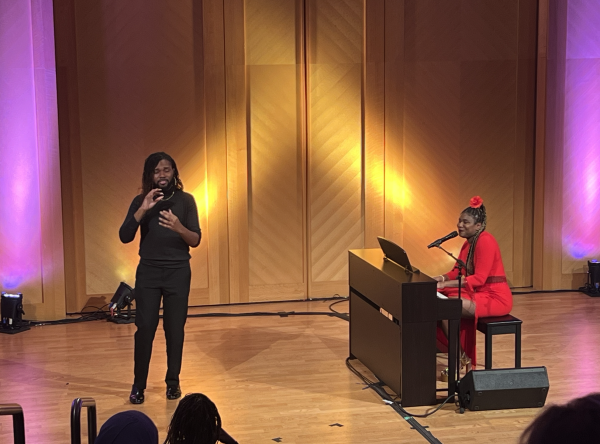An award-winning music artist and advocate for the disability community performed her songs and discussed disability culture at a Feb. 6 event.
Lachi showcased her songs “Far,” “Dis Education” and “Black Girl Cornrows,” which, like much of her music, touch on themes related to her racial and disabled identity. The event was the finale of the ongoing Intersectionality Series from Georgetown University’s Office of Student Equity and Inclusion (OSEI), which seeks to promote the diversity of identities at Georgetown.
During the event, Lachi discussed the need to ensure inclusion within the disability rights movement.
“For a long time, disability rights seemed to only be serving a certain type of person,” Lachi said. “And we wanted to make sure that folks of different races, different sizes, different genders, different sexual preferences, folks who were indigenous, folks of all different creeds were also being included in these laws.”
In addition to being a recording artist, activist and writer, Lachi also founded the Recording Artists and Music Professionals with Disabilities (RAMPD), an organization that works to increase disability inclusivity within the music industry. She also serves as the Diversity, Equity, Inclusion (DEI) Ambassador and New York Board Governor for the Grammy Awards and a consultant to various companies and organizations.
Lachi said intersectionality is crucial in disability culture.
“Disability culture has many meanings,” Lachi said. “We define disability culture as the music, the art, the words, the perspectives, the worldviews and the contributions of people with disabilities from all diversities.”

Lachi said the disabled community perceives disability culture as a collective journey of struggle, strongly and unconventionally overcoming hardships together.
“We see it as the navigation, the winds and the woes and the heroes of our disability community,” Lachi said. “Of having to navigate the world differently, a world that was not built for you. Of having to think creatively, of having to be innovative, resilient and driven.”
“The disability story is the human story,” Lachi added.
Lachi said understanding her own multifaceted identity was important when finding support within the disabled community.
“I identify as black, I identify as a woman, I identify as capital-Q queer, I identify as a daughter of immigrants, and I also identify as a person with a disability,” Lachi said. “I’ve got to say, the best community I started finding of people who started to care about what I had to say was actually the disability community.”
The last third of the event included a brief Q&A led by student and Center for Multicultural Equity and Access (CMEA) intern Bilquisu Abdullah (CAS ’25).
Abdullah said bringing activists like Lachi onto campus provides a platform for diverse and underrepresented voices.
“Georgetown has a long erasure of voices that, quite honestly, are beautiful, deserve to be celebrated, deserve to be platformed,” Abdullah said at the event. “And, it means a lot to me, specifically, seeing the origin story of the Disability Cultural Center being so expansively welcoming to people like me who maybe wouldn’t have felt as welcome on Georgetown’s campus four years ago.”
OSEI coordinated the event with Georgetown Athletics, the Women’s Center, Disability Cultural Center (DCC), the CMEA and LGBTQ+ Resource Center, as a continuation of their Intersectionality Series. The Intersectionality Series has previously featured book launches and film screenings with speakers like sports journalist Katie Barnes, Georgetown professor of Jewish studies Julia Watts Belser, and artist Chella Man.
DCC Director Amy Kenny said the series supports all Georgetown students, regardless of their identities, by promoting the unique cultures that accompany these identities.
“We created a multi-modal series to invite our Georgetown community to engage with us in a variety of ways as part of our commitment to creating a culture of access,” Kenny wrote to The Hoya. “The Disability Cultural Center (DCC) celebrates disability as an intersectional identity through the transformative power of the arts, sciences, and community, which is what Lachi’s vibrant music is all about.”
Women’s Center director Annie Selak, who attended Lachi’s performance, said bringing nontraditional representation onto campus allows students to observe different perspectives.
“So often, we exalt people who followed a very traditional path to success,” Selak wrote to The Hoya. “The intersectionality series upholds that all paths and expressions are worthy.”
Adanna Johnson, Georgetown’s associate vice president for student equity and inclusion, said that even after the closing of the Intersectionality series, OSEI will continue to foster diversity on campus.
“We center joy, we center power to those who have been historically powerless,” Johnson said. “May the seeds planted during this series continue to grow, nourishing a community that thrives on the strength of its diversity and the shared commitment to collective wellbeing.”








